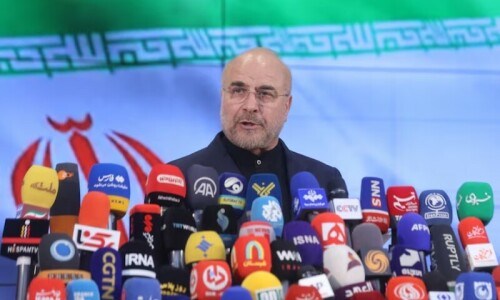Too often in war, it is children that are the worst affected. Their suffering is not just physical; scars and bruises mean little to the hardened war-zone child, be it Yugoslavia, Iraq, Afghanistan, Syria, Gaza or the tribal areas of Pakistan.
The Fata Disaster Management Authority (FDMA) estimates that there are 1,478 registered orphans — defined as girls and boys without a father — among the displaced of North Waziristan. And then those without either parent: 58 such children, 39 boys and 19 girls, have been registered by the authority’s child protection team so far.
We drive into the Baka Khel camp for displaced persons, located in a vast open field a good half-hour drive from Bannu city. There is no shade for miles around, save the few tents that dot the landscape in the distance.
Experts, politicians express concern over IDP crisis
Making our way through layer upon layer of barbed wire, past a row of World Food Programme tents and into the registration area, we encounter a burly subedar holding office. He regards us suspiciously, initially, and then — after we introduce ourselves — cautiously. We explain that we’ve come to interview some of the orphaned children and maybe he can help us identify them.
Thankfully, the subedar tells me, most such children live with host families in either Bannu city or further afield. A few though, have been left to fend for themselves.
The subedar remembers a boy in a red cap, the 14-year-old Mussawir, who came to the camp without any papers. A Wazir from a village on the outskirts of Miramshah, his family of five walked the treacherous 70-odd kilometres to Baka Khel in the blistering July heat. His father passed away some years ago; his eldest brother, 17-year-old Abrar, only made it to the camp on Friday, some four weeks after the rest of the family arrived. None of them have an identity card. Since registration in camps and at distribution points hinges on the possession of a valid identity card, it’s easy to imagine how easily such families are marginalised.
“I drive with a truck from Kohat to Khost; it’s a living,” says Abrar, shrugging his shoulders. I ask if we can speak to the rest of his family. He rushes off in a flurry of Pashto and is back hardly a minute later, family in tow.
We introduce ourselves to his mother, the stately Ladona Bibi. She wears the look of a woman who has spent too long taking care of her family with too little help. Abrar’s cross-border sojourns only fetch them so much, but she cuts a courageous figure nonetheless. When I ask what she said to her eldest boy when he arrived nearly a month late, she chuckles and says, “He went with the truck [to Afghanistan] and just stayed there. We’re glad that he’s back.”
As we talk to their mother, the children arrange themselves neatly in front of her, a captive audience. Even if they understand what she’s talking about, their faces don’t betray the knowledge; they giggle amongst themselves. Little Khadija and Fatima look like two of the most beautiful children in the world; on closer inspection, though, one can see the scars on their faces and the solemn eyes belying each smile. They all wear the same vacant look, so wrong and out of place on their youthful faces.
Young Mussawir, the youth the subedar remembered, is away looking for work in Bannu bazaar. Abrar, the eldest, squatting on the ground next to his mother, says he couldn’t afford to go back to the trucks because that would take him away from his family. “My family needs me. We’re here as long as the operation is on. What choice do we have? Our home, as we knew it, is probably no more,” he muses.
I ask Ladona Bibi for permission to photograph her children, and she surprises everyone by offering to pose with them. Abrar, however, quickly intercedes on grounds of purdah. We take a few pictures and say our goodbyes.
As we leave, a lawmaker from North Waziristan is distributing ‘gifts’ and care packages amongst children and adults. Abrar rushes into the fray in the hope of securing a packet or three, but his younger siblings linger near the swings, with a strange, unnatural calm, passively watching other people tear at each other.
As we drive back through Bannu and pass the massive distribution point at the stadium, I can’t help but wonder how long these clamouring crowds will collect here. How often? And for how little? I can’t help but wonder if this is the only future available to the orphans of North Waziristan, children who have already lost out on a childhood.
Published in Dawn, July 29th, 2014











































